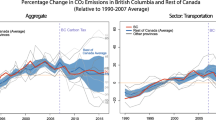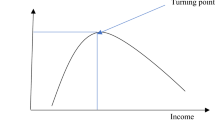Abstract
Raising economic growth is the primary concern of most of countries especially the developing and emerging economies in order to enhance the living standard of people. However, increase in economic activities increases energy demand which rise carbon dioxide emissions and leads to environmental degradation. Technological innovations might be the remedy to overcome the issue of increased carbon dioxide emission by reducing energy use, raise energy efficiency and also push economic growth activities efficiently. In this regard, this study explores the interrelationship of technological innovation, carbon dioxide emissions, and economic growth from 1985 to 2019 in 35 Belt and Road countries. The study uses ordinary least squares, two-step system generalized method of moments, two-step difference generalized method of moments, seemingly unrelated regression, and three-stage least square models for analysis. The results indicate that technological innovations increase economic growth and enhance environmental quality. Foreign direct investment also increases economic growth while degrading environmental quality. Economic growth increases technological innovation while exerting harmful effects on the quality of the environment. The impact of trade on economic growth is positive, while financial development reduces economic growth. School enrollment has a significant and positive effect and increases technological innovation, while foreign direct investment and research and development reduce it. The results also confirm that research and development expenditures significantly reduce carbon emissions and enhance environmental quality. The findings of this study have considerable policy implications for the sample countries with respect to economic growth, technological innovations, and environmental quality.


Similar content being viewed by others
Data availability
Data used in the analysis are available upon reasonable request from the corresponding author.
References
Acheampong, A. O. (2018). Economic growth, CO2 emissions and energy consumption: what causes what and where?. Energy Economics, 74, 677–692.
Afridi, M. A., Kehelwalatenna, S., Naseem, I., & Tahir, M. (2019). Per capita income, trade openness, urbanization, energy consumption, and CO2 emissions: an empirical study on the SAARC Region. Environmental Science and Pollution Research, 26, 29978–29990.
Aghion, P., & Howitt, P. (1990). A model of growth through creative destruction. National Bureau of Economic Research Cambridge.
Akinlo, T., Yinusa, D. O., & Adejumo, A. V. (2021). Financial development and real sector in sub-Saharan Africa. Economic Change and Restructuring, 54, 417–455.
Al-Mulali, U., Ozturk, I., & Lean, H. H. (2015). The influence of economic growth, urbanization, trade openness, financial development, and renewable energy on pollution in Europe. Natural Hazards, 79, 621–644.
Ali, H. S., Law, S. H., & Zannah, T. I. (2016). Dynamic impact of urbanization, economic growth, energy consumption, and trade openness on CO2 emissions in Nigeria. Environmental Science and Pollution Research, 23, 12435–12443.
Anwar, A., Younis, M., & Ullah, I. (2020). Impact of urbanization and economic growth on CO2 emission: a case of far east Asian countries. International Journal of Environmental Research and Public Health, 17(7), 2531.
Arcand, J.L., Berkes, E., & Panizza, U. (2015). Too much finance. Journal Economic Growth, 20, 105–148. https://doi.org/10.1007/s10887-015-9115-2
Asteriou, D., & Spanos, K. (2019). The relationship between financial development and economic growth during the recent crisis: Evidence from the EU. Finance Research Letters, 28, 238–245.
Berthélemy, J.-C., & Varoudakis, A. (1995). Thresholds in financial development and economic growth. The Manchester School of Economic and Social Studies, 63, 70–84.
Bhattacharya, M., Churchill, S. A., & Paramati, S. R. (2017). The dynamic impact of renewable energy and institutions on economic output and CO2 emissions across regions. Renewable Energy, 111, 157–167.
Bilas, V., Bosnjak, M., & Cizmic, T. (2016). Relationship between research and development and economic growth in the EU countries. In: Economic and social development: Book of proceedings, vol. 223.
Burdekin, R. C., Goodwin, T., Salamun, S., & Willett, T. D. (1994). The effects of inflation on economic growth in industrial and developing countries: Is there a difference? Applied Economics Letters, 1(10), 175–177.
Chen, J., Cheng, J., & Dai, S. (2017). Regional eco-innovation in China: An analysis of eco-innovation levels and influencing factors. Journal of Cleaner Production, 153, 1–14.
Dangelico, R. M., & Pujari, D. (2010). Mainstreaming green product innovation: Why and how companies integrate environmental sustainability. Journal of Business Ethics, 95, 471–486.
de Leon, P., Barido, D., & Marshall, J. D. (2014). Relationship between urbanization and CO2 emissions depends on income level and policy. Environmental Science and Technology, 48(7), 3632–3639.
De Vita, G., Katircioglu, S., Altinay, L., Fethi, S., & Mercan, M. (2015). Revisiting the environmental Kuznets curve hypothesis in a tourism development context. Environmental Science and Pollution Research, 22, 16652–16663.
Demena, B., & Afesorgbor, S. K. (2019). The effect of FDI on environmental emissions: Evidence from a metaanalysis. ISS Working Paper Series/General Series, 650(650), 1–41.
Dhrifi, A. (2015). Foreign direct investment, technological innovation and economic growth: empirical evidence using simultaneous equations model. International Review of Economics, 62, 381–400. https://doi.org/10.1007/s12232-015-0230-3
Dooley, K. E. (1999). Towards a holistic model for the diffusion of educational technologies: An integrative review of educational innovation studies. Journal of Educational Technology and Society, 2(4), 35–45.
Du, K., Li, P., & Yan, Z. (2019). Do green technology innovations contribute to carbon dioxide emission reduction? Empirical evidence from patent data. Technological Forecasting and Social Change, 146, 297–303.
Esso, L. J., & Keho, Y. (2016). Energy consumption, economic growth and carbon emissions: Cointegration and causality evidence from selected African countries. Energy, 114, 492–497.
Ganda, F. (2019). The impact of innovation and technology investments on carbon emissions in selected organisation for economic Co-operation and development countries. Journal of Cleaner Production, 217, 469–483.
Gelb, A. H. (1989). Financial policies, growth, and efficiency. World Bank Publications.
Halkos, G. E., & Polemis, M. L. (2018). The impact of economic growth on environmental efficiency of the electricity sector: A hybrid window DEA methodology for the USA. Journal of Environmental Management, 211, 334–346.
Hodson, E. L., Brown, M., Cohen, S., Showalter, S., Wise, M., Wood, F., & Cleary, K. (2018). US energy sector impacts of technology innovation, fuel price, and electric sector CO2 policy: Results from the EMF 32 model intercomparison study. Energy Economics, 73, 352–370.
Hosseini, H. M., & Kaneko, S. (2013). Can environmental quality spread through institutions? Energy Policy, 56, 312–321.
Ibrahim, M. H., & Law, S. H. (2016). Institutional quality and CO2 emission-trade relations: Evidence from Sub-Saharan Africa. South African Journal of Economics, 84(2), 323–340.
Kapoor, R., & McGrath, P. J. (2014). Unmasking the interplay between technology evolution and R&D collaboration: Evidence from the global semiconductor manufacturing industry, 1990–2010. Research Policy, 43(3), 555–569.
Khan, N., Baloch, M. A., Saud, S., & Fatima, T. (2018). The effect of ICT on CO2 emissions in emerging economies: Does the level of income matters? Environmental Science and Pollution Research, 25, 22850–22860.
Khan, I., Han, L., Khan, H., & Kim Oanh, L. T. (2021). Analyzing renewable and nonrenewable energy sources for environmental quality: dynamic investigation in developing countries. Mathematical Problems in Engineering, 2021, 1–12.
Khoshnevis Yazdi, S., & Ghorchi Beygi, E. (2018). The dynamic impact of renewable energy consumption and financial development on CO2 emissions: For selected African countries. Energy Sources, Part B: Economics, Planning, and Policy, 13(1), 13–20.
Kryeziu, N., & Durguti, E. A. (2019). The impact of inflation on economic growth: The case of Eurozone. International Journal of Finance & Banking Studies (2147–4486), 8(1), 01–09.
Knott, A., & Vieregger, C. (2018). Reconciling the firm size and innovation puzzle. In: US Census Bureau Center for Economic Studies Paper No, CES-WP-16-20.
Lv, L., Yin, Y., & Wang, Y. (2020). The impact of R&D input on technological innovation: Evidence from South Asian and Southeast Asian countries. Discrete Dynamics in Nature and Society, 2020, 1–11.
Malik, Y. S., Sircar, S., Bhat, S., Sharun, K., Dhama, K., Dadar, M., Tiwari, R., & Chaicumpa, W. (2020). Emerging novel coronavirus (2019-nCoV)—current scenario, evolutionary perspective based on genome analysis and recent developments. Veterinary Quarterly, 40(1), 68–76.
Mensah, C. N., Long, X., Boamah, K. B., Bediako, I. A., Dauda, L., & Salman, M. (2018). The effect of innovation on CO 2 emissions of OCED countries from 1990 to 2014. Environmental Science and Pollution Research, 25, 29678–29698.
Mert, M., & Bölük, G. (2016). Do foreign direct investment and renewable energy consumption affect the CO2 emissions? New evidence from a panel ARDL approach to Kyoto Annex countries. Environmental Science and Pollution Research, 23, 21669–21681.
Morgan, M. G., & Tierney, S. F. (1998). Research support for the power industry. Issues in Science and Technology, 15(1), 81–87.
Mtar, K., & Belazreg, W. (2021). Causal nexus between innovation, financial development, and economic growth: The case of OECD countries. Journal of the Knowledge Economy, 12, 310–341.
Omri, A., Daly, S., Rault, C., & Chaibi, A. (2015). Financial development, environmental quality, trade and economic growth: What causes what in MENA countries. Energy Economics, 48, 242–252.
Onyinye, N., Oda, S. I., & Anoke, C. I. (2017). Effect of capital formation on economic growth in Nigeria. Effect of Capital Formation on Economic Growth in Nigeria, 5(1), 1–16. https://doi.org/10.9734/AJEBA/2017/36075
Pala, A. (2019). Innovation and economic growth in developing countries: Empirical implication of swamy’s random coefficient model (RCM). Procedia Computer Science, 158, 1122–1130.
Pradhan, P., Mahajani, S. M., & Arora, A. (2018). Production and utilization of fuel pellets from biomass: A review. Fuel Processing Technology, 181, 215–232.
Rafindadi, A. A., & Ozturk, I. (2017). Impacts of renewable energy consumption on the German economic growth: Evidence from combined cointegration test. Renewable and Sustainable Energy Reviews, 75, 1130–1141.
Shahbaz, M., Khan, S., Ali, A., & Bhattacharya, M. (2017). The impact of globalization on CO2 emissions in China. The Singapore Economic Review, 62(04), 929–957.
Sharif, A., Saqib, N., Dong, K., & Khan, S. A. R. (2022). Nexus between green technology innovation, green financing, and CO2 emissions in the G7 countries: The moderating role of social globalisation. Sustainable Development, 30, 1934–1946.
Smulders, S., & De Nooij, M. (2003). The impact of energy conservation on technology and economic growth. Resource and Energy Economics, 25(1), 59–79.
Su, H.-N., & Moaniba, I. M. (2017). Does innovation respond to climate change? Empirical evidence from patents and greenhouse gas emissions. Technological Forecasting and Social Change, 122, 49–62.
Turan, G., & Seni, D. (2014). The effect of trade openness on economic growth: Albanian case. Academic Journal of Interdisciplinary Studies, 3(3), 193.
Ulku, H. (2004). R&D, innovation, and economic growth: An empirical analysis.
Zhang, L., Godil, D. I., Bibi, M., Khan, M. K., Sarwat, S., & Anser, M. K. (2021). Caring for the environment: How human capital, natural resources, and economic growth interact with environmental degradation in Pakistan? A dynamic ARDL approach. Science of the Total Environment, 774, 145553.
Zubair, A. O., Samad, A. R. A., & Dankumo, A. M. (2020). Does gross domestic income, trade integration, FDI inflows, GDP, and capital reduces CO2 emissions? An empirical evidence from Nigeria. Current Research in Environmental Sustainability, 2, 100009.
Funding
No financial support was received for the research, authorship, and/or publication of this article.
Author information
Authors and Affiliations
Corresponding author
Ethics declarations
Competing interests
The authors declared no potential conflicts of interest concerning the research, authorship, and/or publication of this article.
Additional information
Publisher's Note
Springer Nature remains neutral with regard to jurisdictional claims in published maps and institutional affiliations.
Rights and permissions
Springer Nature or its licensor (e.g. a society or other partner) holds exclusive rights to this article under a publishing agreement with the author(s) or other rightsholder(s); author self-archiving of the accepted manuscript version of this article is solely governed by the terms of such publishing agreement and applicable law.
About this article
Cite this article
Khan, I., Zhong, R., Khan, H. et al. Examining the relationship between technological innovation, economic growth and carbon dioxide emission: dynamic panel data evidence. Environ Dev Sustain (2023). https://doi.org/10.1007/s10668-023-03384-w
Received:
Accepted:
Published:
DOI: https://doi.org/10.1007/s10668-023-03384-w




